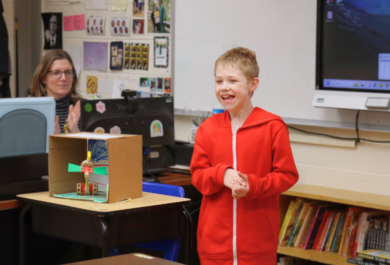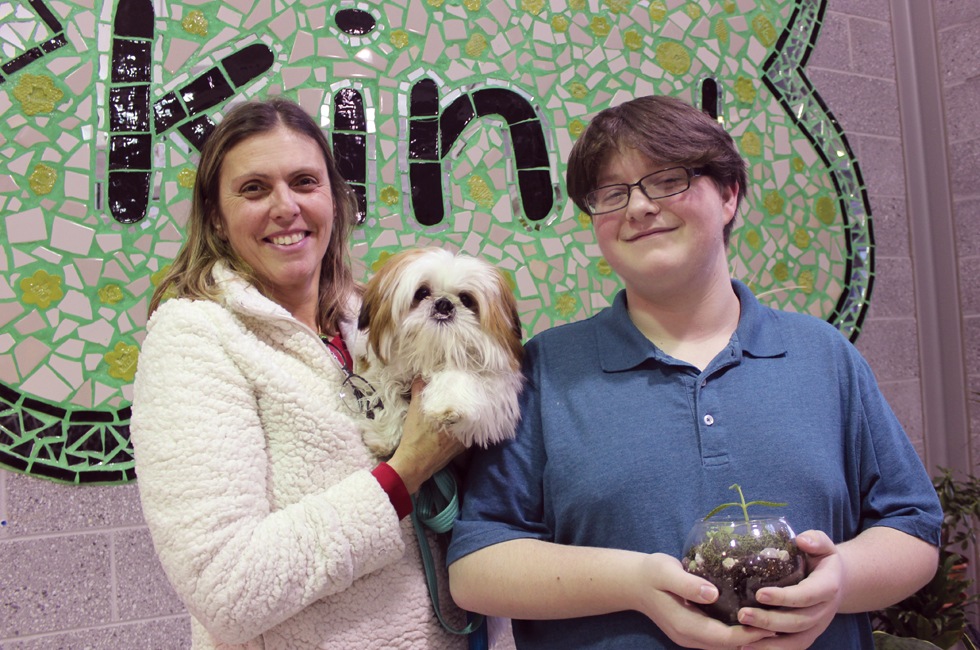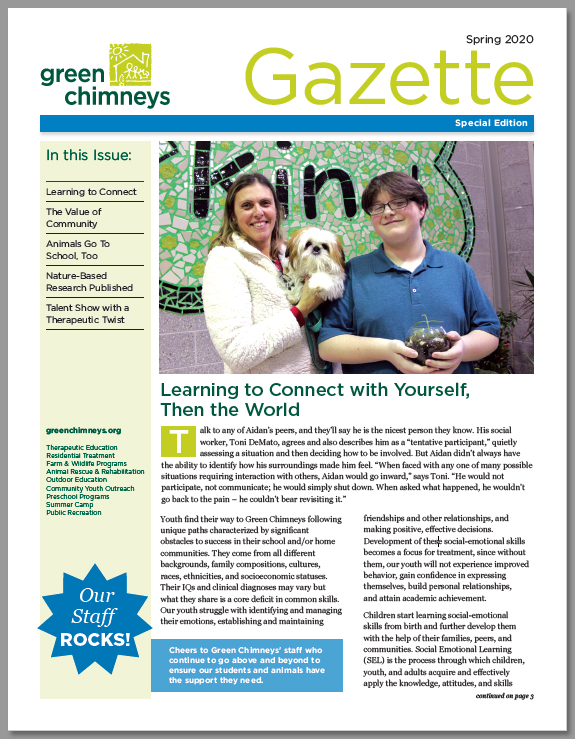Announcements


Talk to any of Aidan’s peers, and they’ll say he is the nicest person they know. His social worker, Toni DeMato, agrees and also describes him as a “tentative participant,” quietly assessing a situation and then deciding how to be involved. But Aidan didn’t always have the ability to identify how his surroundings made him feel. “When faced with any one of many possible situations requiring interaction with others, Aidan would go inward,” says Toni. “He would not participate, not communicate; he would simply shut down. When asked what happened, he wouldn’t go back to the pain – he couldn’t bear revisiting it.”
Youth find their way to Green Chimneys following unique paths characterized by significant obstacles to success in their school and/or home communities. They come from all different backgrounds, family compositions, cultures, races, ethnicities, and socioeconomic statuses. Their IQs and clinical diagnoses may vary but what they share is a core deficit in common skills. Our youth struggle with identifying and managing their emotions, establishing and maintaining friendships and other relationships, and making positive, effective decisions. Development of these social-emotional skills becomes a focus for treatment, since without them, our youth will not experience improved behavior, gain confidence in expressing themselves, build personal relationships, and attain academic achievement.
Children start learning social-emotional skills from birth and further develop them with the help of their families, peers, and communities. Social Emotional Learning (SEL) is the process through which children, youth, and adults acquire and effectively apply the knowledge, attitudes, and skills necessary to manage emotions, develop healthy relationships, set and achieve positive goals, and show empathy and understanding.
In his Learn & Earn sessions at the farm, Aidan took an interest in plant care, including repotting and the different care specific plants require. He also learned how to build terrariums and decided to create one for his social worker Toni, and another for School IEP Coordinator Rachel Crognale. Seeing a change in his typical demeanor, Toni took the opportunity to ask how building terrariums and giving them to people made him feel. Aidan readily replied, “I love doing something good and then feeling good about it.”
Identifying and communicating feelings has been a big part of the social-emotional learning Toni and Aidan have been working on. Making a terrarium requires Aidan to focus and have patience with himself; he becomes at ease enough to recognize and talk about how he feels during the activity. Practicing this skill in a non-stressful setting teaches him to apply the same insight and self-awareness in an adverse situation. Developing his ability to recognize how circumstances around him, good or bad, affect him and make him feel, pave the way for him to manage his emotions or ask for the support he may need. Aidan and Toni have even identified places on campus or daily situations that are challenging for him, such as the “lunch rush” in the dining hall. “I’m able to accompany him and observe his reactions, then we evaluate and discuss together, which helps Aidan to verbalize his feelings and plan his response,” Toni explains.
At Green Chimneys, SEL is integrated into all aspects of a student’s growth and development. Therapy groups teach emotion management, distress tolerance, personal effectiveness, and mindfulness. Effective problem-solving and decision-making skills are taught in classrooms, and when processing crisis situations with students. Classrooms and dorm units incorporate mindfulness activities to start their day, transition from after school, and at bedtime. Our nature-based programs provide opportunities to teach and model empathy, self-awareness, and impulse control by incorporating animals and elements of nature into classroom activities, counseling sessions, and regular jobs around the farm.
Learn more about therapeutic education at Green Chimneys

This story originally appeared on the cover of the spring edition of our printed newsletter, The Gazette. Green Chimneys School closed on March 16, in accordance with all orders from our county and state. Like all Green Chimneys students, Aidan continues to stay connected virtually with his social worker, teacher, and program staff. He’s even kept in touch with Toni’s dog Leo via Zoom, too. Read our special edition of The Gazette online

Crowned the best for falconry in medieval times, gyrfalcons were once reserved for kings. As the largest falcon in the world, with exquisite plumage ranging from bright white to deep charcoal, gyrs are revered for their powerful skill of flight. Their long wings make hunting waterfowl from 3,000-feet-high a feasible and fantastical feat. This falcon was flown in the sport of falconry for several years.